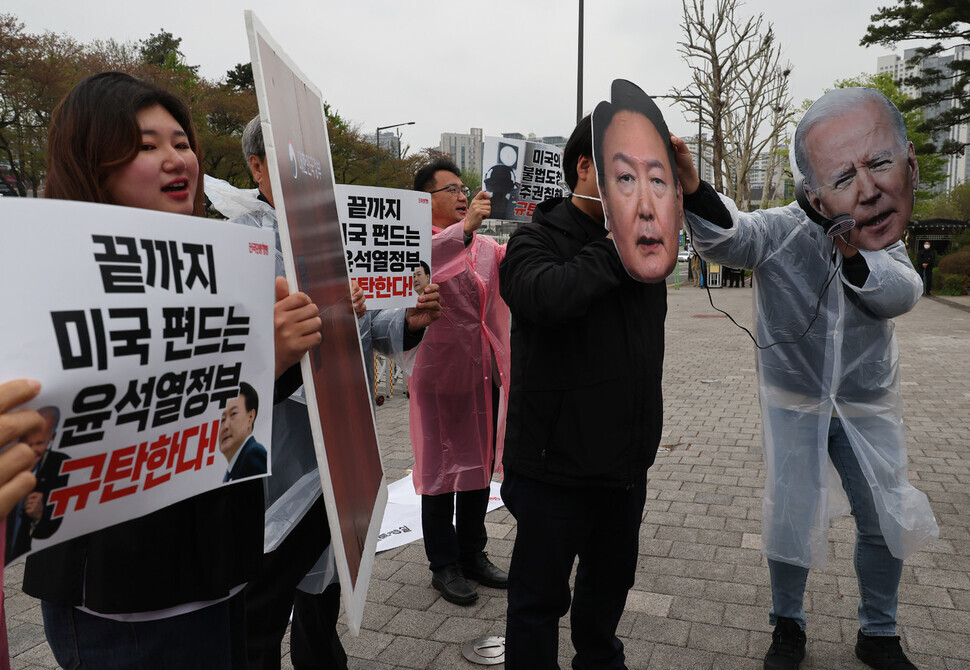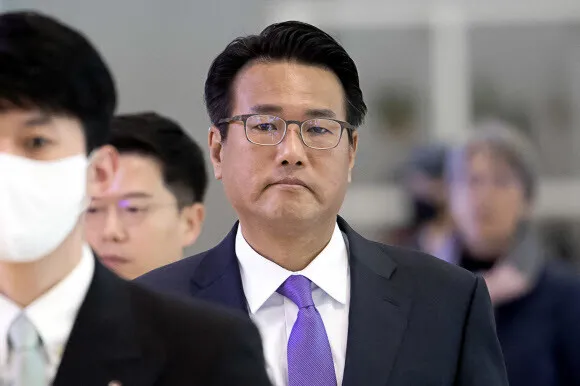hankyoreh
Links to other country sites 다른 나라 사이트 링크
South Korea flatly denies CIA spying allegations without providing evidence

On Tuesday, South Korea’s presidential office expressed that a “substantial number” of the leaked US intelligence documents apparently obtained by CIA spying on the South Korean National Security Office (NSO) had been forged. Just two days after the leaks began making headlines in the US, Seoul is in a rush to get a handle on the issue.
Although the government is claiming the documents are not authentic, they have yet to provide any specific grounds for this and are instead busy emphasizing the intelligence alliance between South Korea and the US.
The presidential office issued an official position on the leaks on Tuesday, arguing that a significant number of the leaked documents were forged.
Despite the controversy that the US eavesdropped and spied on key NSO officials, Yoon’s office didn’t even ask Washington for an apology and instead is taking a passive attitude and acting in close coordination with the US.
“We assessed [the situation] internally, and the US will have conducted its own investigation, but much of the disclosed intelligence was forged. The [South Korea-US] assessment is consistent on this point,” Kim Tae-hyo, first deputy director of the NSO, told reporters on his way to the US.
South Korea seems to have already concluded that the documents were forged despite the US investigation into the matter being ongoing.
“I have no separate message to convey to the US side because someone forged the [content of the leaked documents],” Kim said. “However, since this is a US issue, the Department of Justice will begin searching for the details and forces behind [the leaks] and this will take some time,” Kim added.
Neither the government nor the presidential office has provided any clear grounds to support their argument of the leaks not being authentic.
Immediately after Defense Minister Lee Jong-sup’s emergency phone call with US Defense Secretary Lloyd Austin, the Ministry of National Defense was asked which exact parts of the documents were forged and what kind of explanation the US gave, and how the South Korean defense minister answered. The ministry, however, was unable to answer any of these questions, stating that they had “nothing to communicate” at this time.
Similar silence came from the presidential office. When asked to explain on what grounds the leaks were forged, a key official in the presidential office said, “When, how, or how much I know about an issue can be an important confidential matter so I will not touch on that directly.”
Another high-ranking figure in the presidential office explained that “the US side must have informed us that some content of the documents was forged.”

Meanwhile, NSO officials appearing in the leaks are also denying the content of the conversations referenced in the documents.
For example, Kim Sung-han, the former director of the NSO, said during his investigation that there is a “significant difference” between the content of the reports and the actual conversations that took place.
With only two weeks left until Yoon’s summit with Biden, the Korean government is refusing to take a clear position on whether or not the US actually spied on the NSO, instead placing its focus on responding to controversies regarding the relocation of the presidential office to Yongsan.
An official with Yoon’s administration explained that the correct order of doing things would be to first confirm the facts by assessing if there are any parts in the documents related to South Korea, then to check the veracity of any that may exist, and finally to look into the possibility that the content was exaggerated or manipulated.
The official also responded to the controversy over the hasty relocation of the presidential office to Yongsan, arguing that the security of the presidential office has in fact been strengthened thanks to the move.
“It would have been true that during the time of the Blue House, the main building’s security facilities were prioritized, focusing on the president\'s security, and that other spaces used by secretaries were not as protected as the main building,” the presidential office stated.
“After relocating to Yongsan, the president and his staff work in one building, so the Yongsan building itself has the same level of security as the presidential office,” the office emphasized.
Opposition figures criticized the Yoon’s office for its method of response, saying it was “a political offensive.”
At a meeting of fellow lawmakers, Park Hong-keun, the floor leader of the top opposition Democratic Party, said, “It’s flabbergasting to see them place them blame elsewhere once again when the conversations of the former national security advisor and presidential secretary for foreign affairs, who sit atop the control tower of national security, were leaked verbatim.”
Park said that the administration’s priority should be to “properly explain to the people, and actively lodge a protest with our ally to set things straight.”
By Bae Ji-hyun, staff reporter; Lee Woo-yun, staff reporter
Please direct questions or comments to [english@hani.co.kr]
Editorial・opinion
![[Editorial] Former first lady’s indictment is consequence of her acting as though she were president [Editorial] Former first lady’s indictment is consequence of her acting as though she were president](https://flexible.img.hani.co.kr/flexible/normal/500/300/imgdb/original/2025/0901/8217567182191594.jpg) [Editorial] Former first lady’s indictment is consequence of her acting as though she were president
[Editorial] Former first lady’s indictment is consequence of her acting as though she were president![[Correspondent’s column] A report card for the Lee-Ishiba summit [Correspondent’s column] A report card for the Lee-Ishiba summit](https://flexible.img.hani.co.kr/flexible/normal/500/300/imgdb/original/2025/0829/6917564570694471.jpg) [Correspondent’s column] A report card for the Lee-Ishiba summit
[Correspondent’s column] A report card for the Lee-Ishiba summit- [Editorial] America’s penchant for plundering allies
- [Editorial] Kim Jong-un’s return to diplomacy could be the start of a tectonic shift
- [Editorial] Lee clears first hurdle with Trump, but the race is not over yet
- [Column] Slow-motion authoritarianism
- [Guest essay] The silent calculus behind world leaders’ flattery of Trump
- [Editorial] Lee’s concessions to Japan on history, security leave bitter taste
- [Editorial] ‘Yellow Envelope Act’ is a new chapter in Korean labor rights
- [Column] The era of playing both ends against the middle
Most viewed articles
- 1Why Kim Jong-un opted for a 20-hour train ride to Beijing
- 2Korean chipmakers seek exit strategy from China as Trump tightens export controls
- 3[Column] How Seoul can serve as ‘pacemaker’ for US and North Korea
- 4[Editorial] Seoul could learn from Pyongyang’s overtures to Beijing
- 5Kim Keon-hee, wife of Yoon Suk-yeol, appears before special counsel
- 6Hanbok vs. funeral attire: Fashion highlights political divide as legislative session kicks off
- 7Xi takes swipe at Trump’s ‘bullying’ at SCO security summit
- 8Kim boasts ICBMs before meeting Xi and Putin in Beijing
- 9[Editorial] Former first lady’s indictment is consequence of her acting as though she were president
- 10[Editorial] America’s penchant for plundering allies